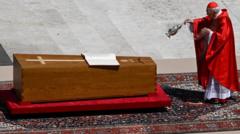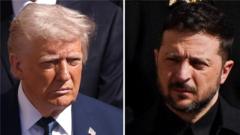**Israel's muted condolences to Pope Francis following his death underscore underlying tensions, particularly in light of the pontiff's vocal support for Palestinians during the Gaza conflict.**
**Tensions Between Israel and Vatican Highlighted by Pope Francis's Death**

**Tensions Between Israel and Vatican Highlighted by Pope Francis's Death**
**Israeli response to the late pope's passing raises eyebrows amid Gaza conflict**
In the aftermath of the death of Pope Francis, Israel's Prime Minister Benjamin Netanyahu has expressed condolences, albeit four days after the event, prompting questions about the government’s sentiments. The initial message, which was warmer and included a photograph of Pope Francis at the Western Wall, was abruptly removed from social media, stirring controversy. In the place of this retraction, a more formal and subdued expression of sorrow was released late Thursday, reflecting a growing discontent with the Vatican's stance on the ongoing Gaza war.
The Israeli delegation scheduled to attend the pope's funeral on Saturday is notably modest, with only the ambassador to the Vatican, Yaron Sideman, representing the country. This contrasts sharply with the robust attendance from other nations, including high-profile leaders such as US President Donald Trump, and echoes the attendance of Israeli officials at the funeral of Pope John Paul II in 2005, where the then-President and Foreign Minister were present.
While President Isaac Herzog shared heartfelt tributes online and referred to Pope Francis as a symbol of compassion, his absence from the funeral—potentially linked to the timing on the Jewish Sabbath—has raised eyebrows. Additionally, the delayed and truncated nature of Israel’s public condolences seems to reflect ongoing grievances regarding Pope Francis’s comments about the humanitarian crisis in Gaza, which some in Netanyahu's coalition view as sympathetic to Palestinians.
Pope Francis had previously suggested that the international community reassess Israel's actions during the Gaza conflict, raising the possibility of classifying them as genocide, a claim Israel strongly rejects. His final public address, which highlighted the suffering of both Palestinians and Israelis, demonstrated his consistent call for peace and reconciliation, often focusing on the plight of those under duress from violence.
In stark contrast to Israel’s response, Palestinian leaders, motivated by Pope Francis's empathic outreach, will send Prime Minister Mohammad Mustafa to pay their respects at the funeral. This contrast highlights a fracture between Israeli governmental feelings and the sentiments expressed by the international community, particularly with the lingering implications of the war in Gaza complicating relations. As the ceremony unfolds in Rome, it may serve as a pivotal moment to show the discord between the current Israeli administration and the Vatican, marking a striking absence of Israel's presence amidst global condolences.
The Israeli delegation scheduled to attend the pope's funeral on Saturday is notably modest, with only the ambassador to the Vatican, Yaron Sideman, representing the country. This contrasts sharply with the robust attendance from other nations, including high-profile leaders such as US President Donald Trump, and echoes the attendance of Israeli officials at the funeral of Pope John Paul II in 2005, where the then-President and Foreign Minister were present.
While President Isaac Herzog shared heartfelt tributes online and referred to Pope Francis as a symbol of compassion, his absence from the funeral—potentially linked to the timing on the Jewish Sabbath—has raised eyebrows. Additionally, the delayed and truncated nature of Israel’s public condolences seems to reflect ongoing grievances regarding Pope Francis’s comments about the humanitarian crisis in Gaza, which some in Netanyahu's coalition view as sympathetic to Palestinians.
Pope Francis had previously suggested that the international community reassess Israel's actions during the Gaza conflict, raising the possibility of classifying them as genocide, a claim Israel strongly rejects. His final public address, which highlighted the suffering of both Palestinians and Israelis, demonstrated his consistent call for peace and reconciliation, often focusing on the plight of those under duress from violence.
In stark contrast to Israel’s response, Palestinian leaders, motivated by Pope Francis's empathic outreach, will send Prime Minister Mohammad Mustafa to pay their respects at the funeral. This contrast highlights a fracture between Israeli governmental feelings and the sentiments expressed by the international community, particularly with the lingering implications of the war in Gaza complicating relations. As the ceremony unfolds in Rome, it may serve as a pivotal moment to show the discord between the current Israeli administration and the Vatican, marking a striking absence of Israel's presence amidst global condolences.






















